Better Sailing


Sailing Crew Roles and Names
The skipper is responsible for the safety of the yacht and the crew’s welfare. However, sailing a boat successfully requires teamwork from the skipper and the crew. This will ensure that all maneuvers—such as leaving a mooring, hoisting sails, changing tacks, reefing, or entering a marina—can be completed with maximum enjoyment and minimum stress.
Boat Captain/Skipper
It may come as a shock, but the skipper is not necessarily the helm. This crew member must ensure that the boat is ready for sailing. He or she needs to make sure that all members of the crew are accounted for. They also need to make sure that food and fuel are sufficient, and sails are ready for hoisting. The skipper is in charge of keeping communications open onboard and help other crew members if needed. Also, they are usually responsible for talking the whole crew through maneuvers as they are about to happen and making sure that all crew members are ready.
What Makes A Good Skipper?
- Responsibility : The skipper is responsible for all aspects of the running of the yacht, its safety, and the crew’s wellbeing.
- Skills : He or she should be comfortable with sailing and navigation skills, inspire confidence in their crew, and be a good communicator.
- Delegation : A good skipper should keep on top of all his or her duties and give the crew tasks that are appropriate to their experience.
- Patience : He or she should be patient with inexperienced crew members and be able to run the yacht with a light touch while retaining respect and authority.
- Briefing : It is the skipper’s role to plan the passage in detail before setting sail.
- Involvement : A good skipper will also encourage the crew to get involved in passage planning and navigation and will always listen to their opinions.
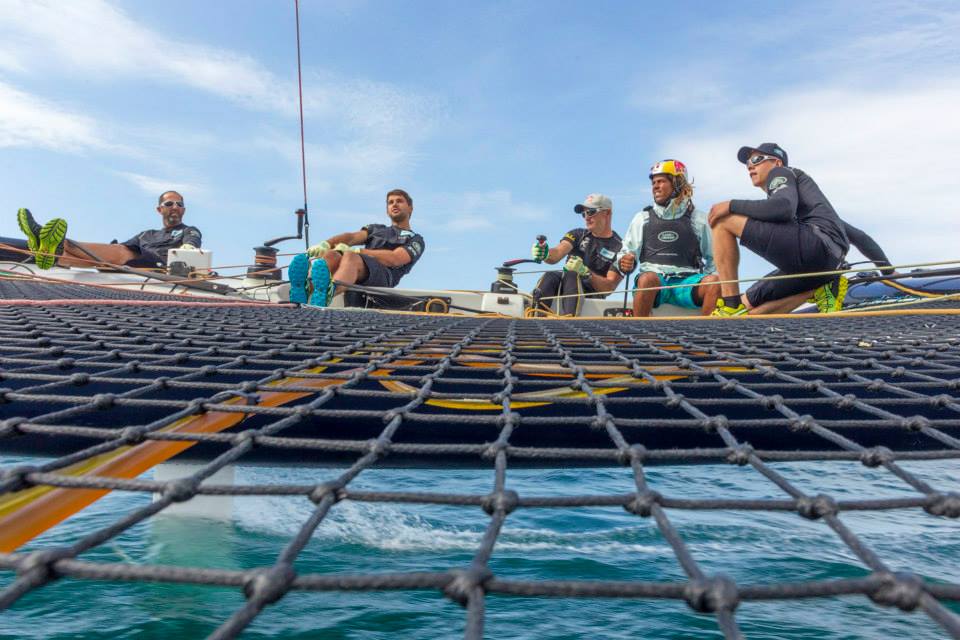
Tactician
The tactician’s role is to get the boat around the racecourse as fast as possible. For that, he needs to take into account the wind, tide, and other competitors, as well as the crew’s ability. They also need to make sure that the boat has the correct course. In short, the tactician is the brains of the sailboat. The tactician must communicate with the helm and skipper to run through maneuvers.
The Helm (Driver)
The Helm is often mistakenly perceived as the skipper. This crew role is to steer the boat where the tactician says and to keep sailing as fast as possible. The helm is also helping with other tasks, but they must focus on the job at hand as much as possible. The helm and the tactician must be in close communication with each other.
Head Sail Trimmers
This crew role is for two members, one who will cut release the sail when going through the tack while the other pulls in the full sail. The crew member releasing can then assist with tailing the sail or trimming it – which is a good example of teamwork. Also, the trimmer should keep adjusting the sail, depending on the point of sail, and should be very focused on that task. Also, the trimmers are in charge of trimming the spinnaker sail and guy when going downwind. Main communication is kept between each other, boat captain and tactician. Pre-start these guys will have a lot to do!
This crew member is in control of all sail hoists and drops depending on the wind. The bowman spends most of their time on the foredeck (the deck at the forward part of the sailboat), preparing for spinnaker hoists, gibes, and drops.
This crew member is a combination of both the bowman and mastman. They are in control of all of the running rigging which comes into the cockpit. This is a vital role and always in the middle of the action. Pitmans must keep communication is between bowman, mast man, and skipper—the eyes and ears for the foredeck crew.
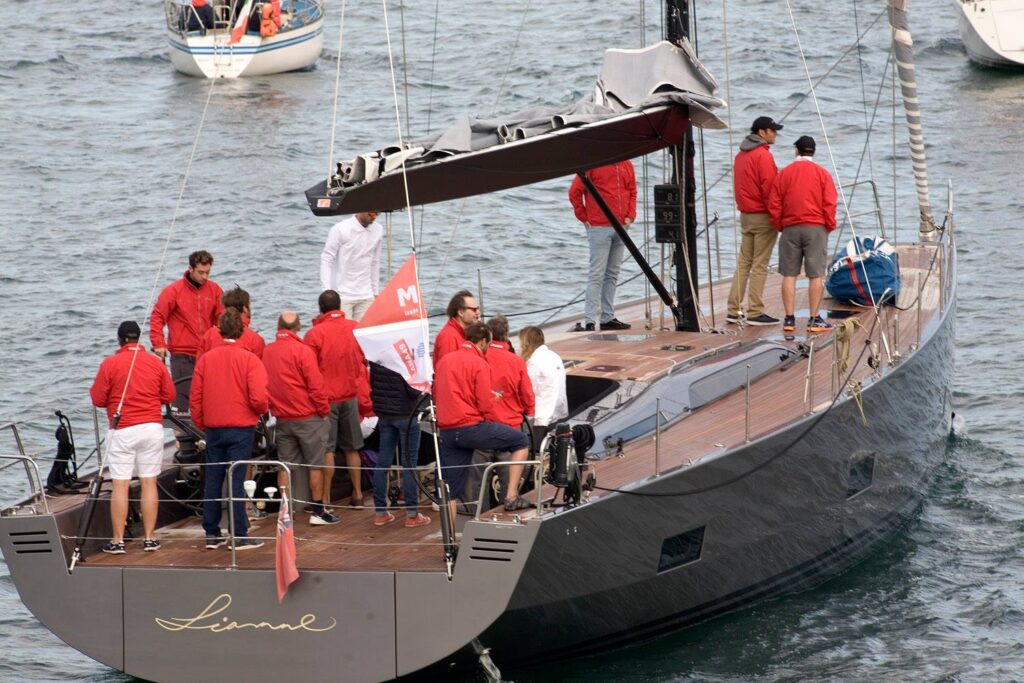
This position is reserved for the stronger members of the crew. A mastman’s foremost task is to assist with the speedy hoisting of the sails during maneuvers. The mast man and bowman go hand in hand and help each other on hoists and drops. The main communication is with the bowman, pitman, and skipper.
No sailing team is complete without its ballast crew members that help to balance the boat in order to reach its top possible speeds and maneuverability. These members of the crew are called ‘ballast’ and are key when racing for the mark. Ballast crew members have the best seat in the house.
What Makes a Good Crew Member?
- Key qualities : All crew members require a positive attitude, sense of humor, and the ability to get along with others in the confined space aboard a cruiser.
- Willingness to Learn : Good crew members are willing to learn and to take an active role in all aspects of running the yacht.
- Attentive : Diligent crew listen to the instructions carefully and ask questions if they do not understand anything.
- Working As a Team : All members of the crew must remember that they are part of a team. A happy gathering in the cockpit at the end of the passage is an indicator that each member of the crew has done their job.
Peter is the editor of Better Sailing. He has sailed for countless hours and has maintained his own boats and sailboats for years. After years of trial and error, he decided to start this website to share the knowledge.
Related Posts

Atlantic vs Pacific: Which is More Dangerous for Sailing?

Why Do Sailboats Lean?

How Does a Boat Sail Upwind? Unveiling the Mechanics of Against the Wind Sailing

How Does Sailing Work? The Physics of Sailing
- Buyer's Guide
- Destinations
- Maintenance
- Sailing Info
Hit enter to search or ESC to close.

Skipper on a Yacht – The Ultimate Guide

When it comes to sailing trips and holidays, a lot of people appear misinformed that it requires extensive knowledge of oceanic navigation as well as operating a boat.
The comforting truth, on the contrary, is that a sailing trip can be enjoyed by complete novices as much as any sailing pro.
Almost all yacht charter companies these days provide a skippered boat with a crew in addition to regular bareboat charters.
In other words, you can enjoy the freedom of being all by yourself in the serene blue ocean without any stress and responsibility.
In fact, in my early experiences on charter boats, I almost always had professional and experienced skippers in charge of navigation and operation. Even now, I often go on sailing holidays with a skipper on a yacht.
In this article, you can learn all about the benefits of hiring a skippered boat, tips to hire a professional and experienced captain, what you can legitimately expect from the skipper during your sailing trip as well as other relevant information.
Table of Contents
Responsibilities of the Skipper
The primary reason for chartering a skippered boat is to hand over the navigation and operation of the yacht to someone who has the necessary experience and knowledge.
In the case of your skipper, you can expect him to ensure the safe passage of the boat through responsible boat handling and safe seamanship.
In the case of a fully crewed yacht, the responsibilities of the skipper include making sure the crew understand and carry out their roles and duties.
The skipper is expected to maintain proper coordination among the crew.
To sum up, the tasks and responsibilities of a skipper are both technical and interpersonal. Apart from operating the boat and navigating it expertly, he should also ensure that the crew is obeying his command dutifully.
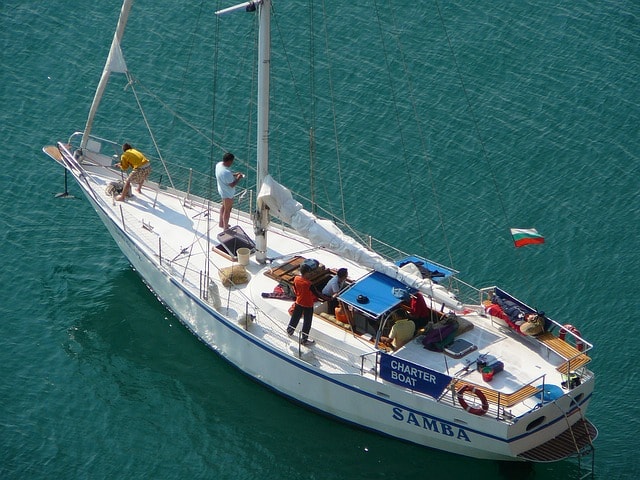
Who Should Choose the Option of a Skippered Yacht?
People with no or little sailing experience would have to choose the services of a professional and experienced skipper to make their trip a success.
Skippered yachts are perfect for those who do not possess a sailor’s license but want to partake in the fun of a sailing holiday.
Also, if you are part of a large group of friends and family, and want to leave the responsibility of sailing to the skipper to enjoy the trip in a stress-free manner, then you should certainly consider a skippered boat.
A skippered boat is also ideal for people who want to sharpen their sailing skill under the watchful eye of an experienced and professional sailor.
Even experienced sailors can benefit from professionally skippered boats if you want to partake in regattas and require that extra bit of help and professional knowledge.
Planning Your Itinerary With the Skipper
One of the best advantages of having a skippered boat comes from the help you would get in planning your sailing itinerary.
The skippers on particular routes have extensive knowledge of the best locations, coves, inlets, and beaches that you and your friends would enjoy during the trip.
They can help you plan the sailing trip in a way that makes it possible for you to see and experience the most during your trip.
Also, skippers are intimately aware of the prevailing weather conditions and may help you tweak your itinerary in such a way that adverse weather does not mar your holiday.
Last, but not the least, skippers know the best and cheapest places to moor the boat so that you do not spend extra at expensive marinas.

Does the Yacht Charter Price Include in Skipper’s Fees?
Yacht charter companies do not include the fees payable to a skipper when you lease their boats.
The fees commanded by the skipper is typically done at the base office, while the invoice for the same is generated and handed over to you after the completion of the trip.
The yacht charter companies only advertise the cost of hiring their boat, without the crew, complements, and skipper, on their brochures and websites.
Accommodation for Skipper Aboard the Boat
It is required that you reserve one of the cabins for skipper and his crew to rest and sleep in during your sailing trip.
Typically, a lot of boats have a special version for charter companies featuring extra cabins so that more people can be accommodated on the boat.
It is not required that you reserve the stateroom or other luxurious cabins for the crew. Typically, yachts come with a dedicated cabin for crew and feature bunk beds.
Who is Responsible for Skipper’s Meals?
It is customary that skippers be provided meals along with the crew by the chartering party. There is no requirement that the food should be fancy or gourmet quality, and the crew and skipper would typically eat whatever you serve.
During your trip ashore in the middle of your sailing holiday, it is considered nice to take the skipper to restaurants along with you.
However, there is no such requirement or custom, and you may just hand him enough cash for a meal at the local fast food joint.
Do’s and Don’ts for Skipper on Board the Yacht
As mentioned above, the primary role of the skipper on board the boat is to ensure a safe and enjoyable trip for everyone.
This means taking care of the technical aspects of sailing, including the correct deployment of mast and sails, safe moorings, checking the weather conditions, guiding the crew, and advise on the route.
The skipper, however, is not obligated to take the route preferred by you if they deem it dangerous due to any reason, including weather.
Similarly, you should not expect the skipper to perform menial tasks such as cleaning.
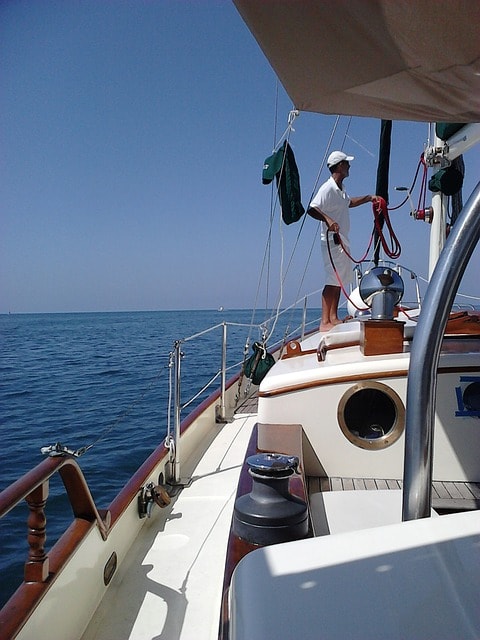
Cost of Hiring a Skipper
The cost of hiring a skipper dependent on some factors including his professional experience, the region you are sailing in, and the sailing season.
On an average, you should expect to pay between Euro 90 to 150 for each day of your sailing trip.
How to Tip the Skipper?
It is customary to tip the skipper at the end of the sailing trip. Typically, the tip works out to 10 percent of his total sailing fee.
However, if you liked his services and recommendations, then you may tip generously. The skipper will certainly appreciate it.
Advantages of Hiring a Skipper
Probably the best part of having a skippered boat is that it allows you to get the most out of your sailing holiday.
- In my personal experience, I have noticed that the presence of a professional and experienced skipper enabled us to plan our itinerary better.
- Many times, the skipper’s intimate knowledge of the local coastline and weather helped us see places that we did not expect and avoid rough weather.
- Skippers know the best places to eat during your trips ashore and have their own local sources to recommend the best places to see and visit.
- Also, you can truly enjoy a stress-free and blissful holiday with your friends and family safe in the knowledge that your boat is in capable hands.
In Conclusion
Skippered boats are probably a perfect way to introduce the joy of sailing holidays to those who have not experienced it before.
Even among those with sufficient sailing experience, there are a lot of benefits to having an experienced skipper in charge of the yacht.
There is no doubt that an experienced sailor would help you get more out of your holiday in every sense of the term. While it may be slightly costlier than bareboat charters, a skippered boat is certainly worth its price.
Need a skipper on your boat? Send your inquiry now, and you’ll receive a free skippered yacht charter quote!
Want to Know More Tips?
Sign up to Cruising Sea newsletter to receive every two weeks the latest post straight to your inbox!
Have you already hired a skipper? If so, what was your experience? Please feel free to share it by leaving a comment just below, I’ll be glad to hear your feedback:)

Daniella has been passionate about travel, the sea, and nature for many years. As a child, she frequently traveled throughout the Mediterranean and continued with her journeys throughout her adult life.
Her experiences have created the desire within her to share her love for traveling with other passionate and adventurers who want to discover beautiful horizons and new cultures.
7 thoughts on “Skipper on a Yacht – The Ultimate Guide”
Hi Daniella,
I just found out that I can charter a yacht with a skipper commandeering it. I was reluctant to go to the sea because I thought I have to go to a “sea” school first.
Especially, when you watch all the Hollywood movies that portray you can go on a cruise without a skipper. And then comes the storm. YUCK!
Now I can safely plan my trip with the skipper’s help. Thank you for bringing this to my attention and corrected my misinformation.
No problem. it’s a pleasure for me to inform the readers, this is the purpose of the website:)
I am happy that the misinformation has been cleared up! And, indeed, you can plan in complete tranquility your next trip with the help of a skipper, believe me, it is worth it:)
Thank you for the comment and wish you a nice day!
Thanks for the information on skippers on a yacht. I have never been on a yacht before and know very little about them except what they look like and are used for! So i enjoyed learning about the skipper as never actually heard that term before. It’s something that i would love to do one day, And the pictures make it seem like it is an amazing experience to have. Maybe one day!
Having a skipper on board is something fabulous:) You don’t need to worry about the navigation at all. They also know the environment well so you can count on him to bring you to best places as well:) Isn’t great?
Thank you for the comment and wish you a wonderful day!
Thank you for visiting my website and for the comment:) To answer your question, most charter companies offer to the client the option to hire a skipper for their sailing holiday. Skippers are not included in the price as they work independently and the cost per day will vary between 120 to 150 Euro, some, even more, depending on the skipper skill. If you own a yacht and you wish to hire a skipper, you can find one at “ Delivery Captain ” I hope it helped and if you need more information, feel free to contact me at any time, I’ll be more than happy to assist!
Have a wonderful day!
I really like your comment about how an experienced sailor would help you get more out of a holiday than sailing on your own. I imagine it would also be a good idea to work with a skipper if you plan to buy your own yacht as well, even if you plan on learning to sail (someone has to teach you, after all). I imagine that a skipper would have a lot of good information about different services as well, like yacht delivery if you plan to move for example.
I am glad you like the comment, thank you for the kind feedback:) Oh, yes, definitely, a skipper will not just navigate the boat, but he will also teach you a lot of things and will bring you to places you don’t know. A skipper is someone you can rely on!
Thank you again for the comment and wish you a wonderful day!
Leave a Comment Cancel reply
By using this form you agree with the storage and handling of your data by this website. *
The role of crew positions and duties on a sailboat
Discover the key crew positions and their duties on a sailboat to ensure a safe and enjoyable journey exploring the open sea with your family.
The Role of Crew Positions and Duties on a Sailboat
Sailing is an exciting and fulfilling way to explore the world with your family, but it’s also a complex endeavor that requires a solid understanding of various crew positions and duties. In this article, we’ll delve into the different roles on a sailboat, their responsibilities, and how they contribute to a successful sailing adventure.
Table of Contents
Introduction, watch leader, galley crew, communications officer.
Before we dive into the specific crew positions, it’s important to note that the size and complexity of your sailboat will determine the number of crew members needed. On a smaller boat, one person may take on multiple roles, while larger boats may require a full crew to operate efficiently. Regardless of your boat’s size, understanding the various roles and their duties will help ensure a safe and enjoyable sailing experience.
The skipper, also known as the captain, is the person in charge of the sailboat. They are responsible for the overall safety and well-being of the crew and the vessel. The skipper’s duties include:
- Planning and executing the sailing itinerary
- Ensuring the boat is properly maintained and equipped
- Making decisions regarding navigation, weather, and safety
- Managing the crew and assigning tasks
- Ensuring all crew members are trained and competent in their roles
- Handling emergencies and making critical decisions under pressure
The skipper should have extensive sailing experience, strong leadership skills, and a thorough understanding of the boat’s systems and capabilities.
The first mate, or mate, is the skipper’s right-hand person and is responsible for assisting with the management of the boat and crew. The first mate’s duties include:
- Assisting the skipper with navigation, weather, and safety decisions
- Supervising and directing the crew in their tasks
- Stepping in as skipper if the skipper is incapacitated or unavailable
The first mate should have strong sailing skills, good communication and leadership abilities, and a solid understanding of the boat’s systems and capabilities.
The navigator is responsible for planning and executing the boat’s course, taking into account factors such as weather, currents, and hazards. The navigator’s duties include:
- Creating and updating the boat’s passage plan
- Monitoring the boat’s position and progress using charts, GPS, and other navigational tools
- Identifying and avoiding potential hazards, such as reefs, shoals, and shipping traffic
- Communicating with the skipper and crew regarding the boat’s course and any necessary adjustments
The navigator should have strong navigational skills, a keen eye for detail, and the ability to think critically and make decisions under pressure.
On longer passages, the crew will typically be divided into watches, with each watch responsible for sailing the boat for a set period of time. The watch leader is responsible for overseeing their watch and ensuring the boat is sailed safely and efficiently. The watch leader’s duties include:
- Ensuring the crew on watch is performing their tasks correctly and efficiently
- Monitoring the boat’s course, speed, and sail trim
- Communicating with the skipper and other watch leaders regarding the boat’s progress and any issues that arise
- Ensuring the crew on watch is well-rested and alert
The watch leader should have strong sailing skills, good communication and leadership abilities, and the ability to make decisions under pressure.
The helm, or helmsperson, is responsible for steering the boat and maintaining its course. The helm’s duties include:
- Steering the boat according to the navigator’s instructions
- Monitoring the boat’s speed and adjusting the sails as needed to maintain optimal performance
- Communicating with the crew regarding sail trim and other adjustments
- Keeping a lookout for potential hazards and other vessels
The helm should have strong sailing skills, good communication abilities, and a keen sense of awareness.
Deckhands are responsible for handling the sails, lines, and other equipment on the boat. Deckhand duties include:
- Hoisting, lowering, and trimming sails
- Tying and adjusting lines, such as halyards, sheets, and dock lines
- Assisting with anchoring and mooring the boat
- Performing routine maintenance tasks, such as cleaning and inspecting the rigging
Deckhands should have a basic understanding of sailing and be able to follow instructions and work well as part of a team.
The galley crew is responsible for preparing meals and maintaining the cleanliness and organization of the boat’s galley (kitchen). Galley crew duties include:
- Planning and preparing meals for the crew
- Ensuring the galley is clean and well-stocked
- Managing food storage and waste disposal
- Assisting with other tasks as needed, such as cleaning and maintenance
Galley crew members should have good cooking skills, be well-organized, and able to work efficiently in a small space.
The engineer is responsible for maintaining and repairing the boat’s mechanical, electrical, and plumbing systems. Engineer duties include:
- Performing routine maintenance on the engine, generator, and other systems
- Diagnosing and repairing mechanical, electrical, and plumbing issues
- Ensuring the boat’s systems are operating efficiently and safely
- Assisting with other tasks as needed, such as sail handling and deck work
The engineer should have a strong technical background, good problem-solving skills, and a thorough understanding of the boat’s systems.
The communications officer is responsible for managing the boat’s communication systems, including radios, satellite phones, and internet access. Communications officer duties include:
- Monitoring and operating the boat’s communication systems
- Ensuring the crew is aware of and follows proper communication protocols
- Communicating with other vessels, marinas, and authorities as needed
- Assisting with navigation and weather information
The communications officer should have a strong understanding of communication systems and protocols, good communication skills, and the ability to think critically and make decisions under pressure.
Understanding the various crew positions and their duties is essential for a successful sailing adventure. Whether you’re sailing with a full crew or taking on multiple roles yourself, being well-versed in these responsibilities will help ensure a safe and enjoyable journey for you and your family. As you gain experience and confidence in your sailing abilities, you’ll be better equipped to handle the challenges and rewards that come with living the sailing lifestyle.
Yacht Crew Wanted
Amateur and professional yacht crewing positions available worldwide, from daysailing to transocean for all experience levels.
Search sailing opportunities
For yacht crew
It’s free for everyone to browse though all of our current sailing opportunities. Become a member to contact yacht owners and join their crew.
For yacht owners
Registration and posting is free if you are looking for a skipper or crew. Find amateur and professional crew for short or long term voyages.
Featured sailing opportunities

Solent Cruising and racing - multiple 2024 dates
Boat type: 1960 - 40 foot Sparkman and Stephens yawl
Location: Hamble

Day sailing in the Solent
Boat type: Macgregor 26M
Location: Hamble river

Liveaboard Captain (f/m) and Business Partner
Boat type: Catamaran
Location: Tortola, BVI
Coastal yacht cruising
Professional sailing jobs, ocean sailing voyages, yacht delivery crew, worldwide opportunities, varied vessel types, all experience levels, mile building voyages, short notice sailing, environmental & wildlife vessels, we are recommended by.

Crewseekers notices
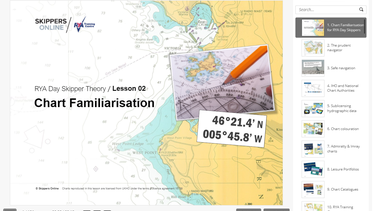
Day Skipper & Yachtmaster theory courses - 20% off
Online RYA theory courses with a great discount courtesy of Crewseekers.
Experienced Co-Skipper for an Aura 51......
More information

What makes an RYA Yachtmaster?
James Stevens, former Chief Examiner of the RYA tell us.
we love sailing as much as you do
Crewseekers is run by experienced, professional sailors offering a friendly and helpful service to yacht crew and owners. We are the original yacht crew introduction agency – established for over 25 years, offering amateur and professional sailing opportunities throughout the world.
Yachting Monthly
- Digital edition

Skippering a boat for the first time: steps to success
- Katy Stickland
- September 18, 2020
Skippering a boat for the first time needn't be daunting, as long as you prepare. Matthew Diggle reveals how to make a success of taking charge

New skippers don't need to be at the helm, and giving crew tasks will keep them happy and motivated. Credit: Matthew Diggle
It’s a pity that skippering a boat for the first time can seem so intimidating.
Not much beats the feeling of being in charge of a yacht, deciding where to go, and taking the crew on an adventure.
And there’s a real sense of accomplishment at the end when you bring the crew and boat home safely.
For anyone who is new to sailing or who crews for someone else, following the RYA training path and becoming a Day Skipper is an excellent way of taking your sailing to the next level.

As you gain confidence you can start to charter and explore new cruising grounds. Credit: Matthew Diggle
It shows that you understand the fundamentals and can take on more responsibility when other people feel daunted by the thought of being responsible for a boat and its crew.
With a bit of preparation and planning, skippering is well within most people’s capabilities, especially if you don’t bite off more than you can chew for the first few trips.
Preparation is the key. Simply put, you have to decide where to go, who to go with, and how to get there.
I thought it would be useful to share the lessons I’ve learned when I first started skippering for those considering taking their first steps.

Skippering a crew
Sailing boats are not particularly spacious down below so I generally don’t try to fill every berth onboard.
Even so, it is vital that the crew can get along together and this means that you have to choose who to invite carefully.
This is often a bit of a juggling act, trying to coordinate different people and boat availability, so in the end you’re unlikely to be able to please everyone.
Just offer some reasonable options and hope for the best.

Careful crew selection will contribute to a happy trip for all. Credit: Matthew Diggle
It is also important that people know what to expect, so they don’t sign up thinking that they’ll have a spacious cabin with en-suite facilities when they’ll actually get a space in the shared forepeak in a boat with a single heads.
Similarly, being clear about the nature of the trip – that this is your first time skippering – will avoid adrenaline-junkies being frustrated by a gentle coastal cruise, or nervous novices being scared rigid during an offshore passage.
When skippering the first few times, it is well worth inviting an experienced and knowledgeable sailor to act as first mate.
But you should choose them wisely as you don’t want anyone who will take over or boss you about if you’re a bit slow working something out, or don’t do things in exactly the way they would.
What you really need is a calm and supportive person who will give you the space to experiment, have a quiet word in your ear if they are concerned that something is wrong, but who is capable of taking over if you are incapacitated in any way.
After all, you have to trust them to come back to pick you up if you have the misfortune to fall in, and you must be confident that they could get the boat and crew to somewhere safe if needed.

A competent first mate will make your life as skipper much less stressful. Credit: Matthew Diggle
In return for the safety and security they provide, you should listen carefully to what they say and pay attention to their skippering advice.
You should also make it clear to the rest of the crew who the first mate is and that they may have to assume command.
It is also sensible to ensure that not all the crew are novices.
Coaching new crew is time-consuming, and sometimes time is in short supply.
It also takes up mental space while your head needs to be concentrating on skippering the boat.
This is especially true when coming into a berth.
Having one or two people capable of handling the fenders and warps will avoid the sort of situation I got into on one of my trips where I didn’t notice the crew were busy trying to remember how to tie the fenders so that when I got the mooring slightly wrong, they didn’t see we were drifting towards another boat and I ended up shouting.
In the end, someone from the other boat pushed us clear, but it definitely wasn’t my finest hour as skipper.

With the crew briefed and kitted up, you’re ready to sail. Credit: Matthew Diggle
I usually send round practical information about arrangements, including advice about what to pack (and what to pack it in), about sharing cabins, what we will do about food, and also some reassuring words about the safety equipment on board.
More experienced crew members will probably already be aware of some or all of these things, but it is a good idea for everyone to have the same information so that there is a common starting point.
But I usually throw an extra sleeping bag in the car and make sure I check everyone’s equipped before setting off, just in case.
Organising a planning meeting, arranging to share lifts to the boat, or making some other excuse to get people together beforehand is a good idea.
The better people know each other, the more smoothly the trip is likely to run.
Encourage people to use email or social media to communicate, but make sure you ask for permission before sharing email addresses or phone numbers.
Keep your first skippering trip in familiar waters
Although it might be tempting to go exploring, you will probably have enough to think about without having to navigate around somewhere entirely new.
Indeed, the Day Skipper qualification says that you are only competent in ‘familiar areas’, but even here you might find yourself sailing from a marina or harbour you’ve not visited before.
If this is the case then do some research to get an idea of what to expect.

Sailing in familiar waters will let you focus on skippering rather than navigating new hazards. Credit: Matthew Diggle
When you pick the boat up, take the opportunity to chat with the charterer and people on other boats nearby to get some local knowledge.
They’re likely to regale you with anecdotes about other visitors who have come to grief in one way or another.
Don’t let these tales put you off, just listen carefully and then you won’t feature in their next story.
Unless you have a particularly trusting boat-owning friend you will probably also need to use your Day Skipper qualification to charter a yacht.
Again, you are better settling for something which is not too adventurous or enormous.
This is not the time to have to deal with something much bigger than you’re used to or with extra sails, rigging, or masts that you’re not accustomed to.
The cost of the trip
One of the first practical aspects of arranging a trip is to sort out the finance.
You will need to cover the cost of the boat, together with mooring and fuel, and then decide whether to include food, meals out, and drinks.
I find that the simplest option is to share all the costs equally, and the first step is to prepare a rough budget so people have an idea of how much the trip is going to cost.
It’s generally better to over-estimate and then give people a small refund, rather than to try to collect an extra few quid from everyone at the end of the trip if, for example, there was a lack of wind and so the fuel costs more than you expected.
You also need to consider what to do about the cost of any damage.
Continues below…

Masterclass: How to lead a happy crew
Toby Heppell gets advice on skippering with friends and family from Pete Goss, Dee Caffari and Conrad Humphreys

Competent Crew: On course for cruising harmony
Katy Stickland joined an RYA Competent Crew course to find out why instruction can make life as a sailing couple…

Night sailing tips for first timers
Cruising after dark doesn't need to be stressful. Toby Heppell shares his tops tips for night sailing

How to raft up safely and securely
James Stevens looks at the seamanship and etiquette needed to raft up and identifies the benefits and pitfalls of coming…
Do you trust everyone to stump up or would it be easier to include insurance in the basic cost of the trip?
You may find that potential crew are rather more enthusiastic about coming on a sailing trip in theory than they are in practice.
Asking them to pay a deposit when booking and the rest closer to departure is a good way of gaining commitment and preventing them from cancelling at the last minute.
Finally, record all expenses and payments so that everyone can check the figures and see that things have been divided up fairly.
This should help prevent disagreements.
There are a number of apps to make both the sums and payment straightforward.
Safety procedures
You are responsible for everyone’s safety and you should take this seriously, but in fact this usually isn’t too onerous if you are sensible and careful.
If you charter a coded vessel in the UK then it will come with a full set of safety equipment appropriate for its cruising limits.
All you will need to do is find where everything is stowed and familiarise yourself with specific details of the lifejackets, jackstays, and so on when you pick the boat up.
Then make sure the crew know how to use it, and do so at the appropriate time.

Brief the crew about safety equipment on board. Credit: Graham Snook/Yachting Monthly
I ask for an emergency contact number for each crew member, and in return let them have details of a shore contact.
I also ask crew members, in confidence, about any medical conditions that might affect them on the trip.
If someone falls ill you don’t want to be scrabbling about trying to find out if they have an inhaler or medication that could help.
Similarly, if you have to hand them over to an ambulance, the medics are likely to ask if they are allergic to common medicines.
There’s no need to share this with anyone beforehand, but I like to leave a copy with the shore contact and let the first mate know where the info is on the boat, just in case it were to be needed.
Catering for your crew
The first step when planning what to eat onboard is to check everyone’s allergies, likes, and dislikes.
With a modicum of thought it is quite feasible to cater for vegetarian, gluten-free, and other diets without making things too complicated.
There’s certainly no excuse for only offering a vegetarian crew member cheese sandwiches for every meal.

Good food on board boosts morale and can be a highlight of the trip. Credit: Matthew Diggle
On short, coastal trips I usually just cater for breakfast and lunch, and aim to eat ashore most evenings.
However, I like to have a simple ‘emergency meal’ on board, such as pasta and a jar of sauce, to make sure we can have a hot meal even if we end up at anchor rather than in a marina as planned.
I find that snacks, fruit, and biscuits are always welcome, and distributing a few chocolate bars can really lift the spirits during a hard slog or a long beat to windward.
Navigating your first trip
Once you’ve selected your crew, booked a boat, and decided on a cruising-ground, it’s time to start on the detailed preparations.
It is worth putting some effort into making the actual trip as straightforward and stress-free as possible.
Skippering means you’ll have lots to think about, so take any opportunity to ‘cheat’ by preparing things beforehand.
Your RYA training will have taught you how to work out tidal depths from the tables in an almanac, but why not print out some tidal curves for the time you’re away, in particular for any marinas you’re thinking of visiting?
Planning and navigation software packages can do this well in advance, and you can find information for the next few days online.
After all, you can still do things the traditional way if you want to impress your crew (or just to prove to yourself that you remember how) but if things are going wrong or time is short then having ‘one you prepared earlier’ can be a literal life-saver.
Weather forecasts
Similarly, you can download weather maps and forecasts for the next few days before setting off.
Obviously, things will change so you will have to re-check the forecast every day, but having a feel for the general weather pattern should help you decide whether to turn left or right when you leave the marina on the first day.
Unless you’re feeling particularly masochistic or determined to experience ‘life at an angle’, it’s not very clever to spend the first half of a trip on a hard beat only to find the weather system passes and you spend the second half on a hard beat back again, when setting off in the other direction initially would have resulted in a pleasant cruise, both ways.

Plan a couple of route options in case the weather changes. Credit: Matthew Diggle
Finally, get hold of any information you can about places you might visit or that you might want to have in reserve as bolt-holes.
Printing out some sketch-maps and pilotage notes can help you stay up on deck rather than spending time below checking the charts.
Share your plan with the crew, but make sure everyone knows that you might have to revise it due to things like a change in the weather.
Picking up the boat
Try to pick up the boat before the crew arrives.
Taking the inventory and doing the handover is much easier if the boat is not full of people and all their kit.
Then put the kettle on ready to give the crew a warm welcome.
If you’re parking a car at the marina then it is sensible to leave as much stuff in it as possible, particularly bulky bags and rucksacks.
A set of dry going-home clothes (and shoes) together with a dry towel and a bag for damp kit is a good idea if you think you might arrive back cold and wet on the last day – and if you’re sailing in the UK that is pretty likely!
Briefing your crew
Brief the crew before setting off.
Keep this simple and to the point; you don’t want to worry people, but it is important to point out the key things.
I usually include:
- Lifejackets and tethers
- Fire prevention and extinguishers
- Galley and gas safety
- First-aid kit
- How to turn off autopilot
- Using winches safely
- Starting the engine
- VHF radio and sending a DSC mayday
- Using the heads
Give a briefing that is appropriate for the crew, so you might have to have a couple of different briefings or even give one to the experienced people and get them to brief it on.
It’s a good idea to show people how to use pontoon cleats before setting off, rather than trying to explain this at the end of the day.
Other things about sailing the boat can be introduced gradually over the course of the day.
Consider having simple standing orders to make it clear what’s expected of the crew.
These should include rules about wearing lifejackets and tethers, such as ‘whenever you want to and whenever I tell you to’.
Remember to let your shore contact know when you set off, and also when (and where) you arrive.
Using the RYA SafeTRX app is a great way of ensuring that they are alerted if you’re overdue and it can also produce records of the trip that the crew may find interesting, but do keep your mobile charged during the trip or you might not be able to close the trip when you arrive, leading to possible confusion or concern.
When skippering, try to keep everyone involved in running the boat.
In challenging conditions it may be prudent to limit some tasks to more confident and experienced crew, but don’t let them dominate and hog the helm or other exciting jobs the rest of the time; make sure that everyone gets a turn.
Remember to be positive about everyone’s efforts, patient if you have to explain things, and gentle if you have to correct someone.
After all, they’re here to enjoy themselves and a harsh word may put someone off ever sailing with you again.

If you can, go with the wind when it blows up. Your crew will thank you. Credit: Matthew Diggle
Keep an eye on the crew so you’re aware if anyone is starting to suffer from seasickness or is getting cold, and deal with it before it gets too bad.
I find that putting seasick crew on the helm or persuading them to lie on a bunk with their eyes closed usually helps.
Hot drinks and an offer to pass up warmer clothes will help a cold crew member who is, perhaps, avoiding going below decks.
You are in charge of the boat and part of skippering is to ensure the crew have confidence in you.
So, remain calm at all times, or at least appear calm while you work out what to do next.
Don’t dither, it’s your responsibility when skippering to make decisions and when faced with a choice almost the worst thing you can do is nothing.
On the other hand, don’t be afraid of changing your plans if conditions change.
Don’t sail on regardless, hoping that things will turn out alright; shorten the trip if the crew are struggling, change the destination if the wind shifts.
Final words on first time skippering

Matthew Diggle started sailing after signing up for the 2011-12 Clipper Race. Since then he’s cruised in UK waters and off the Italian and Croatian coast. Credit: Matthew Diggle
It’s always worth having a debrief at the end of the day and of the trip to reflect on what people enjoyed, learned or didn’t understand, and hopefully this will help ensure everyone leaves happy.
As a skipper you are allowed to have fun too, but it is different to going on a trip that someone else has organised.
It may seem hard work and a little daunting to start with, but you’ll get into your stride after only a few trips.
I find it immensely satisfying when crew tell me that they’ve enjoyed a trip, that they’ve learned new skills, and, most of all, that they want to come back.
So why not start planning a trip and gathering a crew now?
First time skippering checklist
- Select crew with similar expectations
- Mix of abilities and experienced first mate
- Set expectations of boat and plans early
- Email joining instructions ahead of time
- Take a spare sleeping bag and waterproofs
- Meet up before the trip if possible
- Share shore contact details for the boat and get emergency contact for each crew
Cruising grounds
- Stick to familiar areas for first-time skippering
- Research new places you want to visit
- Get some local knowledge from charter company or marina
- Charter in an area you know
- Opt for a modest-sized boat that will be easy to sail
- Stick to white sails and don’t worry about spinnakers
- Arrive before the crew to settle in
- Decide what costs you will cover, and what you will split
- Be clear with your crew about how much it will cost
- Include a margin for extra fuel, and refund if possible
- Ask for a deposit so crew commit
- Check the boat has all the necessary safety equipment and where it is
- Brief your crew on safety gear and procedures, above and below decks
- Check if crew are on medication or have medical requirements
- Check and fit lifejackets
- Establish standing orders of when to wear lifejackets, who is in charge, and who first mate is
- Check for crew allergies, likes and dislikes
- Decide if you’re cooking on board or eating ashore
- Have enough for breakfasts, lunches and a back-up meal
- Take plenty of snacks, tea, coffee and milk
- Print out tide times, tidal curves and weather forecasts beforehand
- Plan a couple of route options to cover different weather scenarios
- Aim to make the first sail an easy one
- Prepare pilotage for new places you plan to visit
- Let shore contact know plans/use RYA SafeTRX app
- Share and rotate roles among crew
- Look out for bored, cold or seasick crew
- Distribute snacks and drinks regularly
- Keep an eye on the big picture – passage plan, weather, navigation and safety
- Teach crew if you have time, but don’t be distracted
- Discuss plans, but you make the final decisions
- Debrief at the end of the day and of the trip
For all the latest from the sailing world, follow our social media channels Facebook, Twitter and Instagram .
Have you thought about taking out a subscription to Yachting Monthly magazine?
Subscriptions are available in both print and digital editions through our official online shop Magazines Direct and all postage and delivery costs are included.
- Yachting Monthly is packed with all the information you need to help you get the most from your time on the water.
- Take your seamanship to the next level with tips, advice and skills from our expert skippers and sailors
- Impartial in-depth reviews of the latest yachts and equipment will ensure you buy the best whatever your budget
- If you are looking to cruise away with friends Yachting Monthly will give you plenty of ideas of where to sail and anchor
- Yachting World
- Digital Edition

How to be a good skipper: ooze calm and confidence but don’t shout!
- March 29, 2016
No two skippers are the same and everyone has different leadership styles, but Chris Tibbs believes certain traits will make you into a skipper that crew will want to sail with

Photo: Mahina Expeditions
We become skippers by a number of different routes; many dinghy sailors will eventually become yacht owners after years of crewing on different yachts. Sea schools are well attended and boats are often keen to take on crew from schools, allowing students to gain experience and miles to help with qualification.
There are also many people who come to sailing later in life; after buying a boat, these people tend to learn from the experience of sailing their own yacht.
I think it is also fair to say that, along with the many ways of getting into sailing and becoming a skipper, good skippers will have different leadership styles – no two are the same. Over the years, having sailed with many different skippers, I have noticed a number of common traits in a good skipper.
By melding together the points I like in a skipper this has hopefully made me a better skipper, both for when I was working commercially running yachts, and now aboard my own.

Photos: Paul Wyeth
I find that a skipper who is calm and confident goes a long way to maintaining a nice feel to a boat. Easily said, but it is a fine balance between confidence and arrogance; and being too laidback can give an impression of laziness, extending to preparations and maintenance. Staying calm and in control during a crisis rubs off on the whole crew and the boat becomes much quieter and under control.
Don’t shout
There is plenty of time for a please and thank you, along with an explanation of what needs doing and how it should be done. It also gives time to work on a solution to any problems and avoids panicked decisions. This is communication in a way that is effective and also pleasant.
People dislike being shouted at (I certainly do); it inhibits crew doing their job as they are afraid of getting it wrong, so they wait until told to do something. This can be very frustrating for a skipper, particularly when racing and the pressure is on, which in turn leads to more shouting.
Article continues below…

ARC weather man Chris Tibbs prepares his boat for ocean cruising
When we bought our Wauquiez Centurion 40s, Taistealai, for ocean cruising, starting with the ARC this year, we had a…

Offshore weather planning: the options for receiving weather data at sea
When I skippered a yacht in the first Atlantic Rally for Cruisers (ARC) 30 years ago the weather planning information…
I equate the amount of noise on board to be in inverse proportion to the sum of knowledge. I do find that being on a boat with a skipper who stands behind the wheel shouting at the crew is not much fun and, if asked back, will generally decline the invitation.
There is something great about helming your own boat in a race, but if you are also trying to run all aspects of the boat from behind the helm you can get stressed. Then your helming declines as your concentration jumps from one task to another.
It is much better to have a crew boss or mate who controls the running of the boat, managing manoeuvring instructions and allowing the skipper to concentrate on helming. The alternative is for the skipper to manage the running of the boat and have a different helmsman. Large racing boats will often have separate helmsman, navigator and tactician, with the skipper in overall control.

This is another important lesson: delegation and training. There are many decisions taken on board that really do not need to involve the skipper once a general plan has been made.
For example, does the skipper really need to micromanage all the food that is bought for a transatlantic passage ? By delegating a large proportion of the running of the yacht to others it does free up the skipper to focus attention on the more important issues.
5 top tips for a good skipper
- Communicate clearly.
- Stay calm and confident.
- Promote fairness and listen to your crew (treat them with respect).
- Be cheerfully available at all times, whenever called.
- Act decisively.
I skippered a yacht in the BT Global Challenge where everyone on board had an area of responsibility, although things would be discussed. We split things up in a number of ways: for example, one crewmember, who worked in the oil industry, was the safety officer.
It was their responsibility to make sure all our safety equipment was in working order and serviced. They would also give a safety briefing to new crewmembers as to where equipment was stowed and how it should be used.
By giving responsibility to a crewmember, it relieves some of the skipper’s duties, but more importantly it helps crew quickly become part of the team. During the last ARC one of our crew arrived only a couple of days before the start – immediately he set to work on a jobs list and his comment afterwards was that it allowed him to familiarise himself with the boat and made him feel part of the crew.
Part of the skipper’s job is to explain and teach; it is pointless to get angry at a crewmember for doing something wrong if they have never been shown how to do it right.
Although it is often easier to do something yourself than explain how it should be done, it is important for other members of the crew to be able to tackle particular jobs.
Then if something needs doing in a stressful situation they will not be doing it for the first time under pressure, when something is very likely to go wrong.
Some crew may not be very experienced, but all should be willing to learn – with a bit of help and encouragement they will soon become efficient crewmembers, whether for a day’s sail, or an ocean passage . I find it easier to hand over the helm when showing what I would like done rather than trying to do it from a fixed place with divided concentration.
You only have to watch manoeuvres in a marina for a short time to spot a boat getting into difficulties and a significant amount of shouting and swearing starts. The skipper has lost control of the boat and will shortly lose control of the crew, then will spend a long time contemplating the wonders of single-handed sailing.
It is important to get away from the blame culture. If something is done wrong a quiet word will be more effective than balling somebody out; most people are upset when they do something wrong and I see no point in making it worst by public humiliation.

As a skipper it is important always to be available and never to be upset or grumpy at being called, even if it turns out not to be necessary. I recall one dark night in the English Channel when the crew on watch were discussing a ship.
One was quite certain that we were passing behind the ship, the other equally certain we were passing in front. On hearing this I got up to find that there was a ship close by and where one crew was seeing the running lights, the second was seeing lights at the stern and in front of us was a wall of steel! A (very) quick gybe and all was well.
I will never ask anyone to do something that I would not be prepared to do myself; whether changing a sail on the foredeck at night in a gale, or climbing the mast . While younger, fitter crewmembers might be better suited to the task, is it safe or right for them to do it? I look at the task and ask myself would I do it? If the answer is yes I do it myself or, if the volunteer will do it better, then I may be persuaded.
If however the answer is no, then we must find another solution. As I get older I may have to change my thinking as it gets more difficult to do the tougher physical activities.

Safety first – Angus Fuller
- Safety, safety, safety – make this a priority, not just on deck, but below: in the galley, moving in the interior, even in the heads.
- Wear lifejackets at night. Always.
- Respect the environment, particularly with a view to pollution.
- Remember you can’t do everything so delegate/rely on crew wherever possible.
- Carry out drills before departure, ensure all crew understand their roles during any scenario. At halfway, have a chat, table top drill or even a full drill in order to keep the crew refreshed.
- Pay attention to detail. This applies to pretty much everything, from maintenance of systems to presentation of the yacht to monitoring the weather .
- Communicate the plan to the crew: a daily briefing on weather (lunch time is ideal), route, any change in this owing to weather and why. At sunset, issue night orders for changes in wind speed and direction.
- Ensure clear parameters are set with the crew so they know when to wake the skipper in the event of changes in weather, shipping, landfall, etc.
- Never be afraid to brief the crew before a manoeuvre – and a debrief after a manoeuvre can be a very useful process for both the skipper and crew.
- Reef when you first think about it – invariably performance doesn’t suffer that much (and is often improved) if it’s a marginal decision.
- Aim to have the yacht arrive in the same condition, or preferably better, than when you departed. By definition this means you will be looking after the yacht properly during the passage.
- Know the cruising area or stretch of water being transited. If you don’t, then heavily research it.
- Exercise seamanship to the very best of your ability at all times and instil this in your watch leaders from the outset.
- Assemble a crew who aren’t just good sailors, but compatible personalities too.
Fairness is all
You also need to be fair, whether this means splitting the watch times so all the crew are happy, or balancing meals and meal preparation. Fairness is important and it is easy to fall into routines where one person feels unfairly treated.
At the start of a long ocean passage on my boat one crewmember, who did not suffer from seasickness , ended up making drinks and snacks for everyone; this became the norm and after a few days they became unhappy because they were doing more than their fair share of galley duties.
Small things like that can quickly become big on a boat at sea. Another time I had a habit of always running the generator and watermaker at the same time of day; this became annoying for the off-watch as it made sleep more difficult, something I was not aware of at first as it did not affect me. Having a time where everyone comes together, maybe meal times, can be a good time to address small issues before they get bigger.

Part of a skipper’s responsibility to the crew is safety and this is not only their direct personal safety, but also the maintenance of the boat and equipment.
I find it useful to have plenty of discussions about what could go wrong and the equipment we have on board and how it can be used.
Man overboard practices and fire drills should be done as a matter of course, but it not always that easy, particularly on short voyages. However, a safety briefing should be done for all new crewmembers even if they are only on board for a daysail.
What is perhaps not so comfortable for skippers is having to resolve interpersonal problems. This may just involve switching the watch system around, or may mean you have to ask someone to leave: not a nice job for anyone to have to do, but a happy boat tends to be a safer boat – and faster if racing.
One problem that can become an issue on races and rallies is how hard the boat will be pushed. What might be pushing hard for a racing person will be different for a cruiser and it is easy for people to become apprehensive (or plain scared) when out of their comfort zone.
Then there is the issue of money on cost sharing or paying your way boats. It is important before committing to sail together to have a firm agreement on what is expected on both sides.
It should also be clear who is paying travel costs as, although a boat may be legally responsible for repatriating crew, most non-commercial yachts expect crewmembers to be responsible for their own travel.
Who’s the leader?
There can be times when a crewmember may be as experienced (or maybe more so) than the skipper. This can cause tension and insecurity in the skipper’s position.
For a day or so it should not be a problem, but on a longer passage a feeling of being undermined can set in. As a skipper it is useful to be open to ideas, they may be better than yours as everyone’s experiences are different, but at the end of the day the yacht is your responsibility.
Trying to get a balance between listening to, but being able to reject ideas may not be easy and can be a difficulty when taking on crew that you may not have sailed with in the past.
I have seen this a number of times in the ARC where a boat has taken on an experienced crewmember, but it has blurred the lines as to who is the skipper and caused tension.
I do find choosing a crew difficult; it does partly depend on what I am intending to do. For a long passage an enthusiastic, positive person will make up for any shortcomings in experience.
We all have to live together so getting on is important, along with a willingness to share all tasks. As we are sharing our boat, which is our pride and joy, respecting and looking after it should be a priority.
Damage will occur and owners/skippers need to be prepared for this, but a carelessly dropped saucepan on the newly varnished cabin sole is avoidable and immensely irritating.
My ultimate test is: would I be happy working on the foredeck in bad conditions with this person? A definite no-no for me is laziness, particularly crew not willing to muck in with the bad bits as well as the good.

Speak to your crew – Tom Cunliffe
- Communication is key. No ‘mushroom management‘.
- Listen/watch, crew and boat.
- Remain cheerful, or at least positive, even when woken during your watch below.
- Above all, make sure all hands are running on the same ‘motivation fuel tank‘. If they all want the same thing, you are three-quarters of the way to a happy ship.
- By all means communicate legitimate concerns, but never irrational anxieties.
- Sit down before you start, agree ship’s articles and all sign them. Everyone must know their duties. If money is involved, details of this must also be inscribed, as well as a probable route with contingencies. Then, when things turn to the bad and aggro starts, you get out the articles and read them together. End of problem (given to me by one crew of Sandefjord , which sailed in the 1950s from South Africa).
Judging competence
Choosing a skipper also has its pitfalls. Experience and competence is difficult to judge on first meeting and going for a sail together is important. Personally I would avoid a shouter at all costs.
Competence levels are more difficult to measure, but a well-run, tidy boat is a good indicator while one with a long jobs list could indicate that things have slipped.
A quick look in the bilges and at the engine can give a clue as to maintenance and a check on lifejackets will show thoughts on safety. I recently did a safety check on a yacht for an event to find that the owners had brand new top of the range lifejackets for themselves while the crew ones were old, without lights or sprayhoods. I am not sure I would have enjoyed sailing on that boat!
Skippering a yacht well is not an easy task, there are so many aspects to the job. It becomes easier with experience and there is no substitute for miles sailed. Good sailors are not necessarily great skippers, but good skippers must also be good sailors.
I have a great deal of respect for the late Sir Peter Blake and, although I never had the privilege to sail with him, I sailed against him on two Whitbread Round the World races . He always found time to have a friendly word and generated great crew loyalty on board his boats.

Be the best leader you can – Jim Thom
- It’s becoming progressively easier to access sophisticated weather information. A good skipper will prepare the yacht for the actual weather, not the forecast he/she’d like.
- Monitor the yacht’s position and the conditions, high and low-tech, from radar/chart plotter to barometer. Even though electronics are increasingly failsafe, a good skipper keeps a record on paper, in the log and on a chart – even the most advanced yachts can be struck by lightning , or suffer power failure . A good skipper will also listen to their senses, and to their sixth sense. They’ll ask themselves where that low swell is coming from or why the seas have become steeper. Shallow reefs may tint the underside of clouds green or blue, and the sound of breakers will hopefully never come as a surprise. Rain has a distinctive smell at sea, as does land and your nose will tell you when ice is near.
- A good skipper will look for the ‘horseshoe nail’ – lost from the messenger’s horse, it triggered the chain of events that lost a kingdom. Regular checks of the yacht, including sails and rig, deck fittings, bilges, steering, engine and machinery, will help the skipper and crew stay ahead of the law of entropy, and out of the incident pit.
- Create a flexible structure without being overly prescriptive. Agree standard practice with the crew: how lines should be made off on a cleat; how to use and make fast on a winch, how to shake out a reef, how to make engine checks, etc. Establishing basic procedures avoids surprises and allows crew to develop skills and think further. A good skipper will prevent boredom and apathy by agreeing daily routine maintenance tasks and helping to develop projects that improve the yacht and teach useful skills on board.
- A good skipper’s best attributes are not related to technical expertise, but to self management, leadership and communication skills. If you develop a set of team and personal goals then a common understanding will prevent many hot spots from forming.
- A good skipper will try to manage their own emotions, knowing the effect they can have on morale. They’ll keep an eye on each member of crew and on the mood of the team, finding reasons to celebrate together – crossing the line, halfway point, a birthday, a good day’s run, or just a great day at sea.
About the authors
Chris Tibbs is a meteorology and weather router, as well as a professional sailor and navigator, forecasting for Olympic teams and the ARC rally.
Angus Fuller is a professional skipper, MCA Chief Mate 3000GT (yachts), who has made 29 transatlantic crossings, 21 as skipper, and one transpacific crossing as skipper, plus one circumnavigation upwind and sailed over 300,000 miles.
Jim Thom has been skipper of a Robert Clarke sail training yacht, a Baltic trader, a Clipper Round the World Race yacht and for four years was captain of the Fife design Kentra . From 2003-2012 he was captain of the 125ft Fife 19 Metre Mariquita with his wife, Lucy, as mate.
Tom Cunliffe is a Yachtmaster Instructor Examiner, author of numerous books on seamanship and is a contributor to Yachting World , responsible for our ‘Great Seamanship’ features.
Search form
Top qualities of great skippers and advice for skippers and crew.
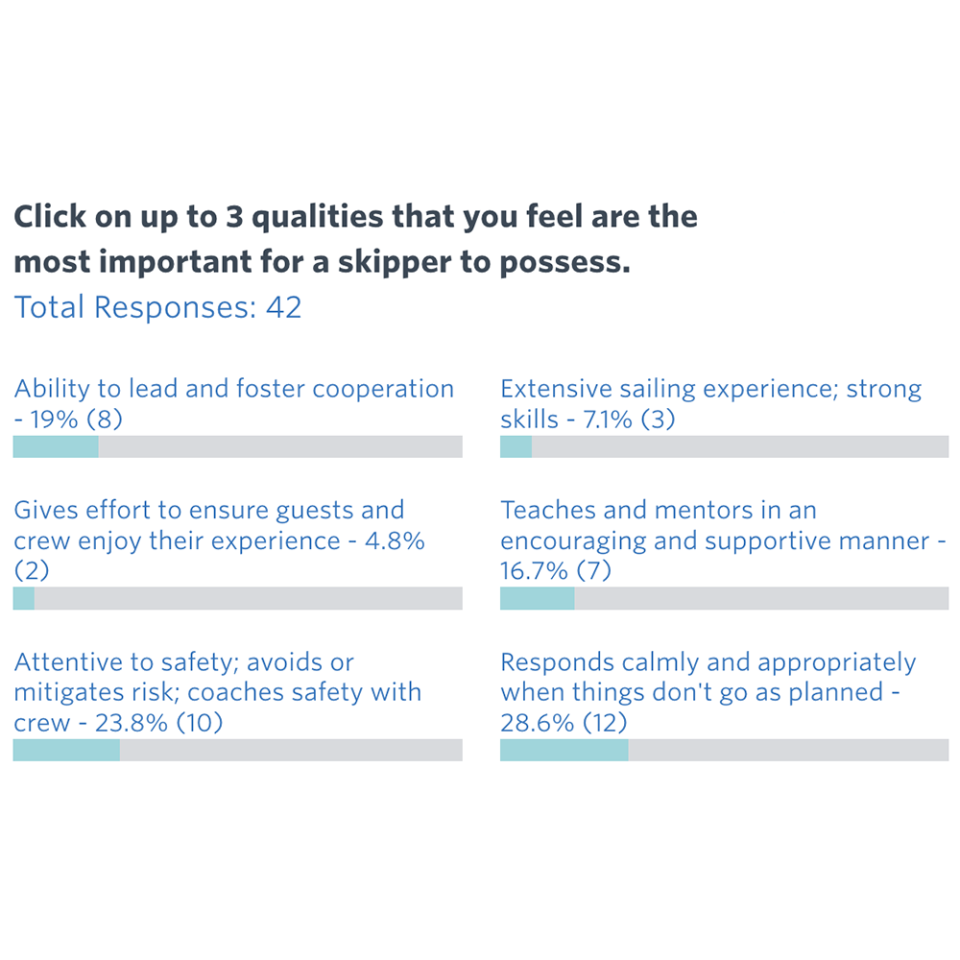
What are the qualities of a great skipper? We asked this question with a survey in our March 31 weekly newsletter on on social media, and here are the results! We’ve listed them in order of least important to most important based on the ratio of your responses.
These qualities may be second-nature to many experienced skippers. For new skippers, these skills will come with preparation and practice. Since a sailor can never be too prepared, we hope that skippers and crew alike will benefit from the advice provided below.
6) Gives effort to ensure guests and crew enjoy their experience. (2 responses / 4.8% of total responses)
Advice for Skippers
Club Skipper Bob Gutgsell said it best when he commented on Facebook: “Understand everyone is on the boat for a different reason and respect that reason.”
Take a moment before departure to have a quick chat with each crew member to find out their level of experience, their expectations, and how much they want (or feel able) to participate in the operation of the boat. Encourage everyone to participate, learn, and practice, but avoid pressuring less experienced, hesistant crew members to perform tasks that they may be unprepared for.
Advice for Crew
Taking ownership of your own comfort and enjoyment will help free up your skipper to focus on safety and leadership.
- Plan ahead by bringing your own safety gear, clothing, beverages, and snacks or meals.
- Ask your skipper if this will be a “dry” sail. If yes, stow any alcoholic beverages you may have brought down below to be enjoyed at the end of the day when the boat is safely back in her dock slip. Remember that if even one person aboard is found intoxicated and an accident occurs, Coast Guard rules have it that the skipper will be held liable. Learn more: https://www.boatus.org/study-guide/planning/bui
- Consider packing extra clothing and/or blankets, ginger candies for upset tummies, or hot beverages to share with your crewmates. Every crew member on board, not just the skipper, can help their crewmates have a good time. Learn more: What to Wear Sailing SF Bay
5) Extensive sailing experience; strong skills (3 responses / 7.1% of responses)
“[Great skippers] have knowledge and are open to learning. I learn something every time I sail.” ~ Bob Gutgsell
It is great news for some of our recent ASA 103, Basic Coastal Cruising and ASA 104, Bareboat Cruising graduates that experience isn't as important when compared to other qualities. So, don’t let a lack of experience mire your confidence. Instead, boost your mindfulness to the qualities that matter most to your crew in the present.
Be supportive and understanding with less experienced crewmates and skippers. Each and every one of us are always learning, including skippers like Bob who have decades of sailing experience.
4) Teaches and mentors in a supportive and encouraging manner. (7 responses / 16.7% of responses)
“A good skipper understands the importance of using proper nautical terms, but also takes the times to ‘translate’ or explain them, so that crew learn to understand what exactly is being communicated.” Bernard Change
When you're the skipper, it’s inevitable that one of the roles you occupy is that of a mentor. Your crew will learn a lot from you, not only in the common nomenclature and habits that you encourage, but in your ability to teach in a manner that will be easily understood and well-received. Also, you have a rare opportunity to not only help build your crew members’ sailing skills, but to help boost their confidence, which can benefit their lives even when they are not on the water. Great skippers can leave a lasting impact on their crew – for the better.
At Modern Sailing, our ASA courses focus on teaching all of our students a common nomenclature that will streamline communication between skippers and crew. Nonetheless, there may be some variety in the way that skippers run their charters. As a member of a sailing club, you will greatly benefit by learning from a variety of skippers. Learn more about the benefits of sailing club membership .
If you’re not sure about something your skipper has asked of you, always ask for clarification. Respect your skipper’s style and do your best to learn from it, even if it’s not what you’re used to. Also, if your skipper is encouraging you to try something new, go for it! A great skipper will not put you or the boat in a situation that jeopardizes safety.
3) Ability to lead and foster cooperation (8 responses / 19% of responses)
If you’re looking to develop your leadership skills in your personal or professional life, being a sailboat skipper is excellent practice. Your crew members will arrive with a variety of abilities, interests, and personalities. Try to take the time to get to know what those are. It’s also important to know when to encourage a crew member to try an unfamiliar task and when to assign tasks to crew who will be most comfortable performing those tasks.
When preparing for a maneuver with inexperienced crew aboard, be certain that you have your crew’s full attention and take the time to clearly explain the steps involved in the manuever. When the crew indicates “ready,” then proceed with the manuever. Initiate necessary maneuvers as early as possible so your crew will have plenty of time to respond. Avoid "cutting it close."
Remember that you are a member of a diverse team that must work together to safely and efficiently operate the boat. Remain open-minded, try to learn something from everyone, and try to make learning fun while you’re at it. If you have a question or a safety concern, bring it to your skipper’s attention. Otherwise, defer to your skipper’s judgement and follow his or her instructions to the best of your ability.
2) Attentive to safety; avoids or mitigates risks; coaches safety with crew (10 responses, 23.8% of responses)
The safety and well-being of your crew and your vessel are literally in your hands. It's a big responsibility that builds character. A great skipper takes the safety aspect of the role with the utmost seriousness, attention, and care above all else. In the event of an emergency, your preparedness and decisions will affect everyone on board.
Reading the articles below will help with your preparedness in a variety of possbily challenging situations. If you can think of an important safety topic not covered in one of these articles, please let us know and we’ll write one up.
- The Crew Briefing – An Essential Safety Practice
- It’s easy to prevent the costly consequences of “prop wrap”
- Common Sailing Injuries and How to Prevent Them
- Handling Emergencies Part I: Predeparture Safety Checks
- Handling Emergencies Part II: Propulsion Loss and 10 Steps to Stay Safe until Help Arrives
- Handling Emergencies Part III: Safety Under Tow
- Steer Clear of San Francisco Bay Shipping Traffic
- How to Avoid Running Aground in SF Bay and What to Do if it Happens
- How to Find Your Way Back to Harbor in the Dark or Fog
- The Keys to Successful Summer Sailing on SF Bay
Your skipper has a vested interest in your safety, but safety is also the responsibility of every individual on board. If you behave in an unsafe manner, all are put at risk. “ We’re all in the same boat ,” as they say!
Every crew member should keep eyes open for boating traffic, floating debris, shoals, and other hazards. Don’t assume your skipper sees them – always speak up to be sure. We also recommend for every sailor to read the articles listed above. This will also contribute to skippers and crew "being on the same page."
1) Responds calmly and appropriately when things don't go as planned. (12 responses / 26.6% of responses)
“[Great skippers] don’t yell at you when you make a simple mistake.” – Andrew Collins
With the exception of a few adreneline junkies perhaps, most people don't like being yelled at. Yelling can trigger a fight/flight/freeze response that can render a crew member unable to respond efficiently. In other words, yelling can make a difficult situation even more difficult.
Survey respondents agree - the ability to keep your wits about you when plans are laid asunder is a highly-prized quality among sailors. When you can maintain your calm in a jam, you are better able to reason the next steps through logically. This is also an important aspect of safety.
Also, the more prepared and/or experienced you are, the more confident you'll be - and better able handle unwanted challenges with aplomb.
Remember that even the greatest skippers are still human beings. In a sticky situation, a skipper may raise his or her voice when needing crew to react to instructions quickly. Try not to take it personally and focus on doing what needs to be done to sail the boat. If you've had a fundamental disagreement with the skipper or feel you’ve been treated poorly, the best time to have a conversation with your skipper is at the end of the day, and preferably, keep it between the two of you.
Share This Page
Testimonials.
We just took our ASA 106 at a school in Rhode Island as we prepare for 6 months of cruising in the Caribbean. The class was great, but more than anything it made us really appreciate the quality of teaching and rigor at Modern Sailing. Even though we were the newest to sailing, the group seemed to think that we had the best fundamentals. We felt very well prepared and we see why Modern Sailing has the reputation it does.
Since many, many years, I had the dream to sail underneath the Golden Gate bridge. On October 14th last year, my dream became true. Thanks to our dear friend Aaron Fritz who made it possible and organized this cruise for us. With this adventure I was able to achieve one more milestone on my sailing career.
Finally on the water, it was great! Full moon made the flows even stronger and it was like sailing in a washing machine.
I did my sailing education in the English Channel, where the situation with the wind and flows is comparable to the San Francisco Bay. So I felt pretty much "at home" being on the helm in the Bay.
I hope our skipper Stan Lander enjoyed this day cruise too. We, definitely did! It was an unforgettable experience for all of us.
A very big thank you to all of you who made it possible, that my dream became reality! Also thank you for the MSC flag I got at the end of the day. It found it's place in my study, where I can see it daily.

Captain Jeff Cathers is really cool. I had such a great time on the Farallones Day Trip . It was actually my very best day of 2020. Thank you so much for coordinating the trip.

View All Testimonials
Follow us on Social Media

Modern Sailing School & Club
Sausalito Location 2310 Marinship Way, Sausalito, CA 94965 (415) 331-8250 (800) 995-1668
Berkeley Location 1 Spinnaker Way, Berkeley, CA 94710 (415) 331-8250 (800) 995-1668
Map / Directions
You are here.
- Exploring the Role of a Skipper in Boating and Sailing
The term " skipper " holds a prominent place in the world of boating and sailing, representing the individual tasked with the operation, navigation, and overall management of a vessel. Whether it's a small boat, a luxurious yacht, or a sailing dinghy, the skipper plays a crucial role in ensuring the safety and smooth functioning of the maritime journey.
Boat Skipper and Yacht Skipper:
The title "boat skipper" is a broad term encompassing individuals in charge of various types of boats , while a "yacht skipper" specifically denotes someone overseeing the operations of a yacht. Both positions require a comprehensive understanding of navigation, safety protocols, and the ability to make informed decisions while at sea.
Charter Skipper:
In the realm of chartering, where individuals or groups rent boats for recreational purposes, a charter skipper may be hired. This professional takes the helm for those who may lack the necessary expertise, ensuring a safe and enjoyable experience for all on board.
Sailing Skipper and Skipper 12 Sailing Dinghy:
A "sailing skipper" is someone well-versed in the intricacies of sailing, adept at harnessing the power of the wind to navigate the waters effectively. Meanwhile, a "Skipper 12" refers to a specific type of sailing dinghy , a smaller boat designed for sailing enthusiasts.
Read our top notch articles on topics such as sailing, sailing tips and destinations in our Magazine.
Sailing a Yacht for the First Time:
For those embarking on their maiden voyage aboard a yacht, having an experienced skipper on board is often recommended. Navigating a yacht for the first time can be a complex endeavor, and the guidance of a seasoned skipper ensures a smoother introduction to this maritime adventure.
Hiring a Skipper:
Individuals who own boats but lack the necessary skills or time to operate them may opt to hire a skipper. This allows them to enjoy the pleasures of boating without the responsibilities and challenges associated with captaining the vessel
Read more useful sailing tips:
How to become a yacht/boat skipper:.
Aspiring skippers often undergo training and certification processes to acquire the skills and knowledge needed for the role. This may involve learning about navigation, safety procedures, and gaining hands-on experience in boat handling.
Skippers Choice Marine Supply:
In the marine industry, businesses like "Skippers Choice Marine Supply" cater to the needs of skippers and boat enthusiasts, providing a range of products and services to enhance the boating experience.
In conclusion, the term "skipper" encompasses a diverse range of roles in the maritime world, from steering a small boat to captaining a luxurious yacht. Whether hired for a charter, sought for guidance in sailing, or responsible for the day-to-day operation of a vessel, the skipper is a central figure in the world of boating and sailing, ensuring safe and enjoyable journeys on the water.
So what are you waiting for? Take a look at our range of charter boats and head to some of our favourite sailing destinations .

IMAGES
COMMENTS
What Makes A Good Skipper? Responsibility: The skipper is responsible for all aspects of the running of the yacht, its safety, and the crew’s wellbeing. Skills: He or she should be comfortable with sailing and navigation skills, inspire confidence in their crew, and be a good communicator.
In this article, you can learn all about the benefits of hiring a skippered boat, tips to hire a professional and experienced captain, what you can legitimately expect from the skipper during your sailing trip as well as other relevant information.
The skipper, also known as the captain, is the person in charge of the sailboat. They are responsible for the overall safety and well-being of the crew and the vessel. The skipper’s duties include: Planning and executing the sailing itinerary. Ensuring the boat is properly maintained and equipped.
A skipper is someone who is in charge of a boat, responsible for its navigation, safety and overall operation. They possess a high level of seamanship and nautical knowledge, gained through years of training, experience and certification.
For yacht owners. Registration and posting is free if you are looking for a skipper or crew. Find amateur and professional crew for short or long term voyages. Find sailing crew
Skippering a boat for the first time needn't be daunting, as long as you prepare. Matthew Diggle reveals how to make a success of taking charge. New skippers don't need to be at the helm, and giving crew tasks will keep them happy and motivated. Credit: Matthew Diggle.
A good skipper will prevent boredom and apathy by agreeing daily routine maintenance tasks and helping to develop projects that improve the yacht and teach useful skills on board.
Advice for Skippers. The safety and well-being of your crew and your vessel are literally in your hands. It's a big responsibility that builds character. A great skipper takes the safety aspect of the role with the utmost seriousness, attention, and care above all else.
Embark on a maritime journey as we delve into the multifaceted world of skippers. Explore the responsibilities of boat and yacht captains, learn about the intricacies of sailing with a skipper, and uncover the essential role they play in ensuring safe and enjoyable experiences on the water.
Skipper will captain any yacht that you choose within the fleet including all monohulls, sail and power catamarans. You can pay for a skipper per day or for the whole duration of your charter. Your skipper will require a cabin for the duration of their time aboard.